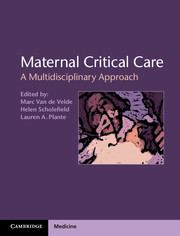Book contents
- Maternal Critical Care
- Maternal Critical Care
- Copyright page
- Dedication
- Contents
- Contributors
- Preface
- Section 1 General non-medical considerations
- Section 2 General medical considerations
- Section 3 Special critical care tools and techniques
- Section 4 The pregnant patient with coexisting disease
- Section 5 Serious problems related to pregnancy
- Index
Section 2 - General medical considerations
Published online by Cambridge University Press: 05 July 2013
- Maternal Critical Care
- Maternal Critical Care
- Copyright page
- Dedication
- Contents
- Contributors
- Preface
- Section 1 General non-medical considerations
- Section 2 General medical considerations
- Section 3 Special critical care tools and techniques
- Section 4 The pregnant patient with coexisting disease
- Section 5 Serious problems related to pregnancy
- Index
Summary
Keywords
- Type
- Chapter
- Information
- Maternal Critical CareA Multidisciplinary Approach, pp. 107 - 178Publisher: Cambridge University PressPrint publication year: 2013
- 1
- Cited by

